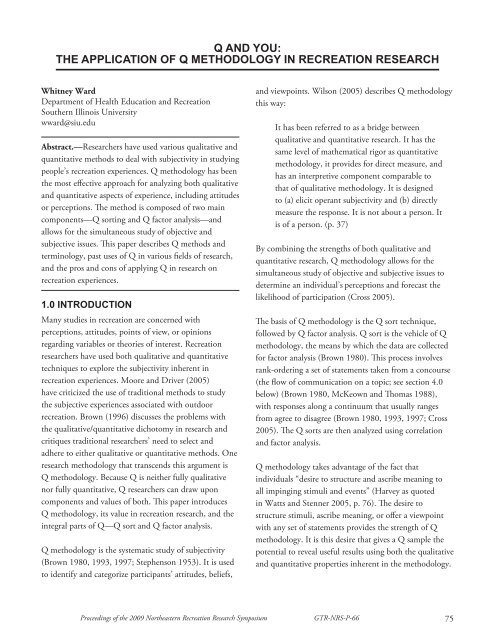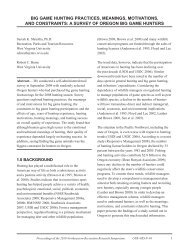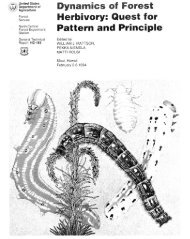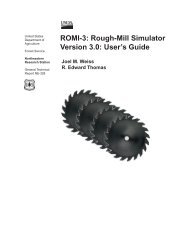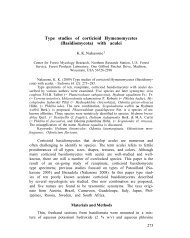Proceedings of the 2009 northeastern recreation research symposium
Proceedings of the 2009 northeastern recreation research symposium
Proceedings of the 2009 northeastern recreation research symposium
Create successful ePaper yourself
Turn your PDF publications into a flip-book with our unique Google optimized e-Paper software.
Q AND YOU:<br />
THE APPLICATION OF Q METHODOLOGY IN RECREATION RESEARCH<br />
Whitney Ward<br />
Department <strong>of</strong> Health Education and Recreation<br />
Sou<strong>the</strong>rn Illinois University<br />
wward@siu.edu<br />
Abstract.—Researchers have used various qualitative and<br />
quantitative methods to deal with subjectivity in studying<br />
people’s <strong>recreation</strong> experiences. Q methodology has been<br />
<strong>the</strong> most eff ective approach for analyzing both qualitative<br />
and quantitative aspects <strong>of</strong> experience, including attitudes<br />
or perceptions. Th e method is composed <strong>of</strong> two main<br />
components—Q sorting and Q factor analysis—and<br />
allows for <strong>the</strong> simultaneous study <strong>of</strong> objective and<br />
subjective issues. Th is paper describes Q methods and<br />
terminology, past uses <strong>of</strong> Q in various fi elds <strong>of</strong> <strong>research</strong>,<br />
and <strong>the</strong> pros and cons <strong>of</strong> applying Q in <strong>research</strong> on<br />
<strong>recreation</strong> experiences.<br />
1.0 INTRODUCTION<br />
Many studies in <strong>recreation</strong> are concerned with<br />
perceptions, attitudes, points <strong>of</strong> view, or opinions<br />
regarding variables or <strong>the</strong>ories <strong>of</strong> interest. Recreation<br />
<strong>research</strong>ers have used both qualitative and quantitative<br />
techniques to explore <strong>the</strong> subjectivity inherent in<br />
<strong>recreation</strong> experiences. Moore and Driver (2005)<br />
have criticized <strong>the</strong> use <strong>of</strong> traditional methods to study<br />
<strong>the</strong> subjective experiences associated with outdoor<br />
<strong>recreation</strong>. Brown (1996) discusses <strong>the</strong> problems with<br />
<strong>the</strong> qualitative/quantitative dichotomy in <strong>research</strong> and<br />
critiques traditional <strong>research</strong>ers’ need to select and<br />
adhere to ei<strong>the</strong>r qualitative or quantitative methods. One<br />
<strong>research</strong> methodology that transcends this argument is<br />
Q methodology. Because Q is nei<strong>the</strong>r fully qualitative<br />
nor fully quantitative, Q <strong>research</strong>ers can draw upon<br />
components and values <strong>of</strong> both. Th is paper introduces<br />
Q methodology, its value in <strong>recreation</strong> <strong>research</strong>, and <strong>the</strong><br />
integral parts <strong>of</strong> Q—Q sort and Q factor analysis.<br />
Q methodology is <strong>the</strong> systematic study <strong>of</strong> subjectivity<br />
(Brown 1980, 1993, 1997; Stephenson 1953). It is used<br />
to identify and categorize participants’ attitudes, beliefs,<br />
and viewpoints. Wilson (2005) describes Q methodology<br />
this way:<br />
It has been referred to as a bridge between<br />
qualitative and quantitative <strong>research</strong>. It has <strong>the</strong><br />
same level <strong>of</strong> ma<strong>the</strong>matical rigor as quantitative<br />
methodology, it provides for direct measure, and<br />
has an interpretive component comparable to<br />
that <strong>of</strong> qualitative methodology. It is designed<br />
to (a) elicit operant subjectivity and (b) directly<br />
measure <strong>the</strong> response. It is not about a person. It<br />
is <strong>of</strong> a person. (p. 37)<br />
By combining <strong>the</strong> strengths <strong>of</strong> both qualitative and<br />
quantitative <strong>research</strong>, Q methodology allows for <strong>the</strong><br />
simultaneous study <strong>of</strong> objective and subjective issues to<br />
determine an individual’s perceptions and forecast <strong>the</strong><br />
likelihood <strong>of</strong> participation (Cross 2005).<br />
Th e basis <strong>of</strong> Q methodology is <strong>the</strong> Q sort technique,<br />
followed by Q factor analysis. Q sort is <strong>the</strong> vehicle <strong>of</strong> Q<br />
methodology, <strong>the</strong> means by which <strong>the</strong> data are collected<br />
for factor analysis (Brown 1980). Th is process involves<br />
rank-ordering a set <strong>of</strong> statements taken from a concourse<br />
(<strong>the</strong> fl ow <strong>of</strong> communication on a topic; see section 4.0<br />
below) (Brown 1980, McKeown and Th omas 1988),<br />
with responses along a continuum that usually ranges<br />
from agree to disagree (Brown 1980, 1993, 1997; Cross<br />
2005). Th e Q sorts are <strong>the</strong>n analyzed using correlation<br />
and factor analysis.<br />
Q methodology takes advantage <strong>of</strong> <strong>the</strong> fact that<br />
individuals “desire to structure and ascribe meaning to<br />
all impinging stimuli and events” (Harvey as quoted<br />
in Watts and Stenner 2005, p. 76). Th e desire to<br />
structure stimuli, ascribe meaning, or <strong>of</strong>f er a viewpoint<br />
with any set <strong>of</strong> statements provides <strong>the</strong> strength <strong>of</strong> Q<br />
methodology. It is this desire that gives a Q sample <strong>the</strong><br />
potential to reveal useful results using both <strong>the</strong> qualitative<br />
and quantitative properties inherent in <strong>the</strong> methodology.<br />
<strong>Proceedings</strong> <strong>of</strong> <strong>the</strong> <strong>2009</strong> Nor<strong>the</strong>astern Recreation Research Symposium GTR-NRS-P-66<br />
75


